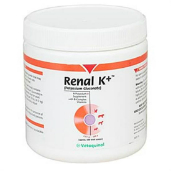Hypokalemia refers to low blood potassium levels. Potassium is a mineral that functions as an electrolyte, meaning it helps balance fluid levels in the body. It is also essential to a variety of other biological processes, including regulation of the muscles, nerves, and heart. Left unchecked, hypokalemia can have devastating, even deadly effects. All cats and dogs are susceptible to hypokalemia.
Causes of Hypokalemia in Cats and Dogs

Hypokalemia most often results from chronic kidney disease (CKD) or kidney failure. The kidneys are responsible for maintaining appropriate potassium levels, so when their function is impaired, potassium levels can drop. Regulating potassium levels is a key part of managing CKD.
Dehydration, defined by depleted fluids and electrolytes, is another common cause of hypokalemia. Sweating--be it from overheating, physical exertion, or fever--is an underlying cause of dehydration. Other common underlying causes include severe vomiting and diarrhea.
Excessive urinary output (which itself can be caused by a number of conditions, medications, or IV fluid administration), certain metabolic disorders, dialysis, insufficient dietary intake of potassium (including from a poor diet, lack of appetite, or starvation), stress, insulin or glucose administration, or an intestinal obstruction, can also lead to hypokalemia in cats and dogs.
Signs and Symptoms of Hypokalemia in Animals
When not severe and caused by minor dehydration, hypokalemia is unlikely to produce clinical signs. However, as potassium levels further deplete or stay low for a longer period, hypokalemia presents with various symptoms in pets. Increased thirst and urination are commonly seen, as is vomiting, diminished appetite, and lethargy. Over time, there will be weight loss, muscle pain, loss of muscle mass, weakness, and possibly paralysis of the muscles involved in breathing. Your pet may appear intoxicated from generalized weakness and difficulties with physical activity.
"Left unchecked, hypokalemia can have devastating, even deadly effects."
If you observe any of these symptoms, take your cat or dog to your veterinarian. A simple blood test can measure the level of potassium in your pet’s blood to confirm or rule out the diagnosis. Always wait for a confirmation of hypokalemia before attempting to treat the condition on your own, as the listed symptoms are associated with other serious medical conditions. Moreover, improper or unnecessary treatment of hypokalemia can trigger hyperkalemia, or too much potassium in the blood. This condition is also dangerous. If your veterinarian diagnoses hypokalemia, further examinations and tests may be needed to look for underlying causes.
Treating Low Potassium Levels in Cats and Dogs
If your pet’s potassium deficiency is severe, she may be admitted into a veterinary hospital for intravenous potassium and other therapies needed to bring dangerous symptoms under control. Your pet’s heartbeat may need to be stabilized and/or treatment of your dog or cat’s paralyzed respiratory muscles may be necessary.
Regardless of the severity of the condition, potassium supplementation is key to reversing hypokalemia. If IV potassium is not necessary, an oral potassium supplement such as Tumil-K or Renal K+ is indicated. If dietary causes are found, you can make appropriate changes according to your veterinarian’s recommendations. Underlying medical conditions require management to control secondary hypokalemia on an ongoing basis, and periodic blood tests are used to monitor blood potassium levels and adjust supplement dosing, as needed.
References
http://www.petmd.com/dog/conditions/endocrine/c_dg_low_potassium
http://www.vcahospitals.com/main/pet-health-information/article/animal-health/hypokalemia-or-low-potassium-levels-in-cats/288
The above is provided for information purposes only and should not be used for the diagnosis or treatment of any condition.
This information does not cover all possible variables, conditions, reactions, or risks relating to any topic, medication, or product and should not
be considered complete. Certain products or medications may have risks and you should always consult your local veterinarian concerning the treatment of
your pet. Any trademarks are the property of their respective owners.